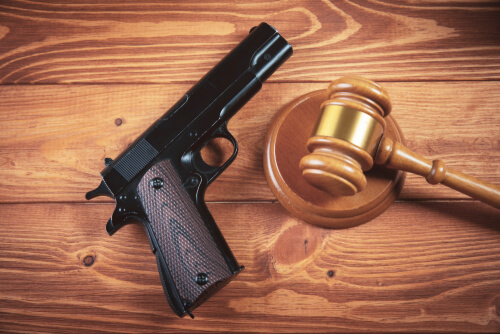On June 21, 2024, the United States Supreme Court decided the case of U.S. v. Rahimi. The principal issue before the Court concerned when a domestic violence restraining order is a basis to prohibit firearm possession.
Chief Justice Roberts wrote for the 8-1 majority in relevant part: Respondent Zackey Rahimi was indicted under 18 U. S. C. §922(g)(8), a federal statute that prohibits individuals subject to a domestic violence restraining order from possessing a firearm. A prosecution under Section 922(g)(8) may proceed only if the restraining order meets certain statutory criteria. In particular, the order must either contain a finding that the defendant “represents a credible threat to the physical safety” of his intimate partner or his or his partner’s child, §922(g)(8)(C)(i), or “by its terms explicitly prohibits the use,” attempted use, or threatened use of “physical force” against those individuals, §922(g)(8)(C)(ii). Rahimi concedes here that the restraining order against him satisfies the statutory criteria, but argues that on its face Section 922(g)(8) violates the Second Amendment. The District Court denied Rahimi’s motion to dismiss the indictment on Second Amendment grounds. While Rahimi’s case was on appeal, the Supreme Court decided New York State Rifle & Pistol Assn., Inc. v. Bruen, 597 U. S. 1 (2022). In light of Bruen, the Fifth Circuit reversed, concluding that the Government had not shown that Section 922(g)(8) “fits within our Nation’s historical tradition of firearm regulation.” 61 F. 4th 443, 460 (CA5 2023).
When an individual has been found by a court to pose a credible threat to the physical safety of another, that individual may be temporarily disarmed consistent with the Second Amendment. Since the Founding, the Nation’s firearm laws have included regulations to stop individuals who threaten physical harm to others from misusing firearms. As applied to the facts here, Section 922(g)(8) fits within this tradition.
The New Jersey statute affected by this opinion is N.J.S.A. 2C: 39-7 “Certain Persons Not to have Weapons or Ammunition.” The statute makes it a third-degree crime for a person convicted “of a disorderly persons offense involving domestic violence . . . to possess . . . a firearm or ammunition.” It is not clear if this statute would apply to a person convicted of a petty disorderly persons offense involving domestic violence.”

